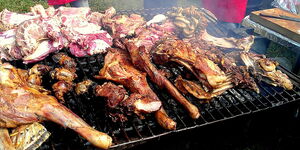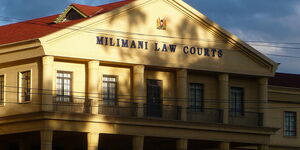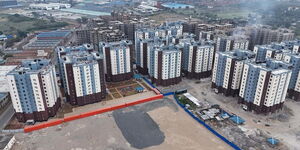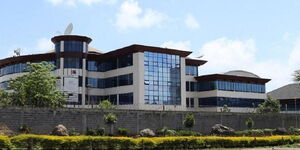"I will not lower taxes. You will have to pay because there is no other way we can build facilities, roads, and schools,” President Uhuru Kenyatta directed after Kenyans complained about several taxes unveiled by the Treasury.
“We must pay taxes,” he insisted, arguing that the funds will be channelled towards funding development projects. According to data by the Kenya National Bureau of Statistics (KNBS), three-quarters of all Kenyans working in the formal sector earn below Ksh50,000 per month.
The new taxes on airtime, bank loans and liquefied petroleum gas, coupled with the high cost of fuel, food prices and even the proposal to reintroduce construction levies are weighing heavy on the taxpayers' shoulders.
Uhuru signed into law a bill that increased the rate of excise duty on telephone and internet data services from 15 percent to 20 percent. Bank charges on loans also rose from 7.5 percent to 20 percent. The government sneaked in the new taxes through a report tabled in Parliament by the Departmental Committee on Finance and National Planning.
The taxes were excluded from the Finance Bill 2021 which saw MPs reject taxes on bread, flour, fishing equipment and purchase of motorcycles.
Speaking to Kenyans.co.ke, Nicholas Gachara - Somakazi CEO and a financial expert based in Nairobi - clarified how the new taxes and high cost of living affects the majority of Kenyans and how one can survive.
How to Survive on Ksh40,000 Salary
Gachara advises that
1. Saving on Costs
One can cut down credit costs and revert to texts and Whatsapp calls and audio, video and image messages. They can also take advantage of bonuses, airtime and data offers by telcos.
On fuel, motorists can reduce travelling expenditures and only travel when necessitated. Individuals can also carpool and those with students in schools can use private transport companies rather than schools - whose transport costs are quite expensive.
2. Alternative Measures
Rather than using LPG, or firewood which will lead to litigation, individuals can use green energy, solar and biogas, considering that electricity prices have also soared. Individuals in urban areas can save on electricity.
3. Budget
“Stick to your budget, shop with a shopping list rather than impulse buying. You can also shop in bulk so that you manage your finances. Also utilise loyalty/reward points offered in supermarkets,” Gachara advised adding that consumers can reduce expenditure especially on miscellaneous activities. They can also negotiate bills.
Paying through mobile money can also save transaction costs.
4. Track and Record Your Spending
Gachara noted that one should save receipts, tickets and bank statements for calculation purposes. “Your bank statements, for a start, will tell you how much money is going into your bank account, how much is going out and where it is going. You can then compare it with your budget to see whether you are sticking to it or not.”
4. Side hustles
This can come in handy for skilled professionals as they supplement income. One can also avoid unnecessary loan borrowing from banks and shylocks and revert to raising soft loans from friends and employers - salary advance.
5. Open a savings account
“No matter what, save! Save! Save the little you can. Remember that above all if you reside in rental houses, rent should be a third of your income,” Gachara stated, advising that individuals can also relocate to affordable areas.
Effects of the New Taxes
Food prices have soared with 1 litre of cooking oil rising from Ksh180 to Ksh240, Ksh350 more was added on LPG gases owing to the introduction of the 16 percent VAT. This means a 6kg LPG costs Ksh1,250 up from Ksh950.
Maize flour rose from Ksh97 to Ksh106. Fuel prices in July 2021 were at Ksh127.14, Ksh107.66, Ksh97.85 for Petrol, Diesel and Kerosene respectively as compared to Ksh106.9, Ksh96.4 and Ksh84.7 respectively in January 2021.
“It is good that the government is constructing roads and infrastructure, but this is coming at a cost for taxpayers who would repay through taxes and tolls on certain roads. The budget allocated to development is highly inflated. With the elections coming in 2022, Kenyans should brace for a tough time,” Gachara warned.
The tax expert added that the new taxes will cost-push inflation to consumers as the government is under heavy pressure to collect revenue through low-hanging fruits - avenues that affect all Kenyans.
The effects will be seen through Kenyans seeking alternatives that may backfire on government policies, such as opting to use firewood rather than LPG. The government banned logging in 2018.
The IMF Effect
Kenya will receive a Ksh255 billion loan from the International Monetary Fund. However, the loan was tied with stringent measures such as reduction of wage budget, halting salary increments and revealing secret investors.
Gachara opined that the government is the largest employer and civil servants will feel the pinch too. Coupled with this is that both civil and private sector workers will be discouraged from borrowing after loan charges rose to 20 percent.
Banks on the other end will cut down on loan offers as they will be wary of the increase in default rates.
Additional reporting by Ian Mulei












